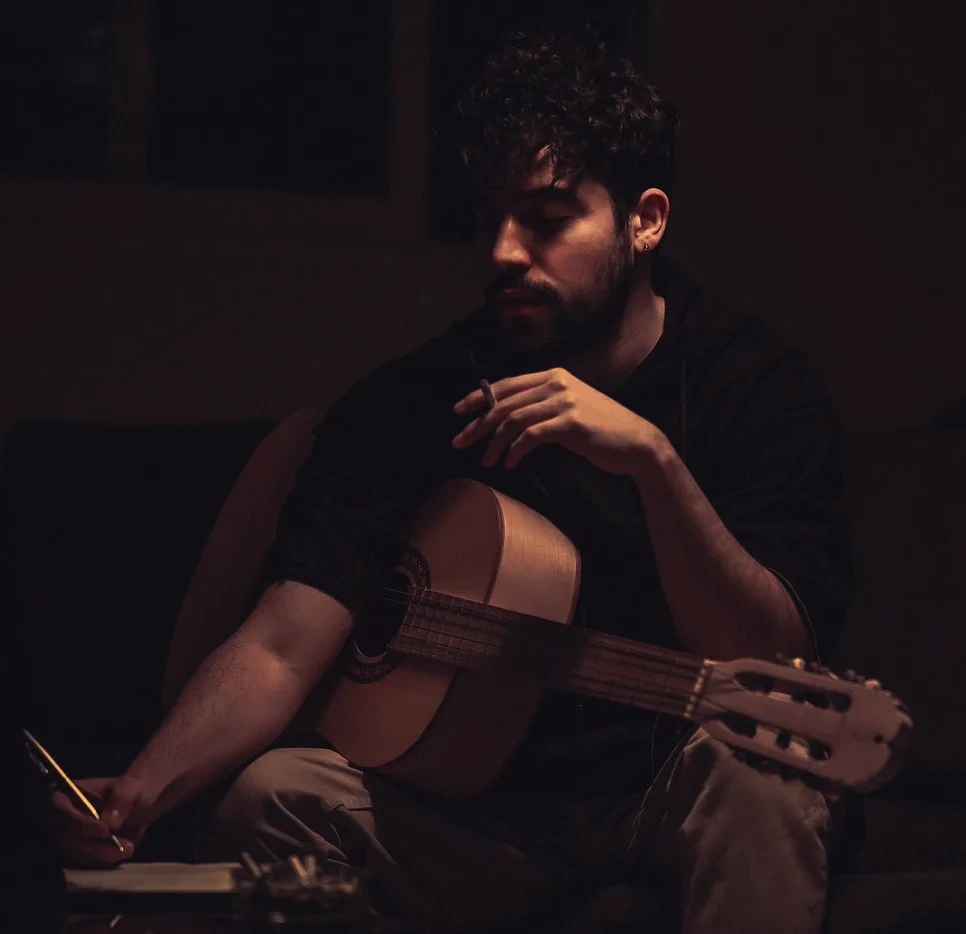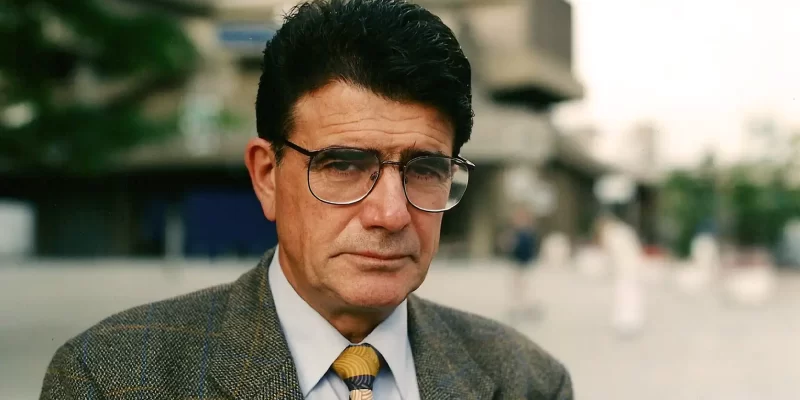
Shervin Hajipour
Shervin Hajipour, an Iranian singer-songwriter from Babolsar, grew into a symbol of resistance and optimism through his songs. He kicked off his music career by posting covers on social media in 2018. Hajipour’s path took a key shift with his first single “Maybe Paradise” and reached its high point with “Baraye”. This track didn’t just make him popular among Iran’s young crowd; it also turned into the main song of the 2022 protests. This led to his groundbreaking win at the 65th Annual Grammy Awards where he became the first artist to receive the Grammy Award for Best Song for Social Change for “Baraye”.
The song “Baraye” made waves worldwide. Jill Biden, the First Lady, called it a “powerful and poetic call for freedom and women’s rights.” It struck a chord with people standing for sorrow, rage, optimism, and a desire for change during the protests sweeping Iran.
This worldwide attention didn’t just show how Hajipour touched people across the globe. It also proved how music can bring people together to push for social change. This marked a big moment in Hajipour’s work and in the larger story of how music plays a part in activism.
The Rise of Shervin Hajipour
Shervin Hajipour started his musical journey . He took his first violin class at age eight. His love for music grew in high school where he began to compose . Hajipour studied economics at the University of Mazandaran, but this didn’t stop his music dreams. He composed music for theater shows and editing while in college. This led him to start singing. His early music experiences laid the groundwork for a career that would later make him a voice for social change.
Early Life and Musical Beginnings
- Hajipour came into the world on March 30, 1997, in Babolsar Mazandaran. At eight years old, he started to learn the violin, which sparked his interest in music.
- As he went through secondary school, he began to compose music . This showed his growing skills and commitment to the art form.
- He then went to the University of Mazandaran to study economics. While there, he kept writing music for theater and later started singing too.
Hajipour’s music career changed when he joined the New Era TV talent show at 22 years old. His songs impressed both viewers and judges helping him reach the finals in the show’s first season. Iran Broadcasting worried about possible future issues, but they couldn’t deny Hajipour’s skill. This contest gave him a chance to show off his musical talent and kicked off his rise in Iran’s music world.
Breakthrough with ‘Baraye’

The year 2022 was a turning point for Hajipour when he released “Baraye,” a song that struck a chord with Iranians and others worldwide. “Baraye” came out of the protests across Iran after Mahsa Amini’s death giving voice to what Iranians felt and hoped for.
Hajipour wrote the lyrics using tweets from protesters, and the song blew up online getting over 40 million views on Instagram in just two days. It had such an effect that other Iranians on social media and those living abroad started using it as their protest song. This huge response showed that Hajipour wasn’t just making music; he was speaking up for social change, which led to him gaining fame and praise around the world.
Grammy Award for ‘Baraye’
Shervin Hajipour’s song “Baraye” made Grammy history by winning the first Grammy Award to recognize songs that bring about social change. The Grammys created this award to honor music that tackles social issues and drives positive change worldwide.
“Baraye” became a rallying cry for protesters in Iran after Mahsa Amini’s death. People praised the song for its strong message supporting freedom and women’s rights. Hajipour wrote the lyrics using only messages Iranians posted online about why they were protesting. Each line starts with “baraye,” which means “For” or “Because of” in Farsi. Some lines say “To dance in the streets, to kiss loved ones” and “for women, life freedom.” These words struck a chord with listeners across the globe helping the song gain widespread recognition and make a big impact.
Historic Win
- Award Presentation: U.S. First Lady Jill Biden handed out the Grammy for Best Song for Social Change. She stressed how the song brings people together and motivates change across the globe. She called “Baraye” a “strong and lyrical demand for freedom and women’s rights”.
- Global Recognition: After “Baraye” went viral, it got a huge number of entries for the Grammy category. Out of 115,000 submissions, 95,000 were for Hajipour’s song. This massive backing showed that people worldwide understood how important the song was.
- Hajipour’s Reaction: Hajipour couldn’t go to the Grammy ceremony because of legal limits in Iran. He thanked everyone and shared the win with his Instagram followers. He just posted “We won”.
Impact and Reception
- International Solidarity: “Baraye” caught on worldwide, not just in Iran but also in other countries, including Iranian communities abroad. People all over the globe have chanted its message of “women, life, freedom” at protests showing how the song speaks to everyone.
- Celebrity Endorsements: The song’s reach went beyond Iran’s borders to the global music scene. Big names like Coldplay performed “Baraye” to show they stand with Iranians in their push for freedom.
- Recognition and Awards: Besides winning a Grammy, Shervin Hajipour made it onto Time magazine’s list of 100 Most Influential People in the World in 2023. This achievement highlights how the song has affected global culture and the current fight for human rights in Iran.
- A Movement Beyond Music: “Baraye” grew from a song into a symbol of resistance and hope for Iranians and human rights supporters worldwide. Its message keeps inspiring actions and talks about freedom, justice, and the strength of people’s voices together.
Artistic Influences and Musical Style

Shervin Hajipour’s music career shows his personal skill and reflects Iran’s wider culture and politics after the 1979 Islamic Revolution. Iranian music in the country dropped sharply when the Islamic Republic took over forcing many artists to quit or leave Iran. Yet, a few such as Mohammad Reza Shajarian and Shahram Nazeri, kept working because they backed the revolution before it won. This time saw a total ban on female singers and pop musicians working, which led to much less variety and expression in music.
Impacts on Hajipour’s Music
The easing of limits after Mohammad Khatami won the presidency in 1997 sparked a comeback of popular music, though with fresh faces. This time also saw the growth of the underground music scene, a direct result of the tight controls on musical expression. Musicians of all styles, who couldn’t get permits from the Ministry of Culture, found a home in this underground world. The internet’s arrival during President Khatami’s term helped these underground artists reach more people even with the ongoing cultural rules. It’s worth noting that rap, rock, and metal – words banned in Iran – grew strong in this hidden scene.
Changes in Style
Shervin Hajipour, an R&B and hip hop singer, came from this underground music scene. His song “Baraye” drew inspiration from the tragic death of Mahsa Amini and the protests that followed. It captures the shared complaints and hopes of the Iranian people.
The lyrics taken from tweets by protesters, touch on many issues from women’s rights to political corruption. This shows Hajipour’s skill to turn the mood of the times into music. This approach has deep roots in Iran’s current social and political situation. It also builds on the country’s rich musical past and the resilience of its artists in the face of adversity. Hajipour’s musical journey, from his early days in a violin class to becoming a voice for social change, highlights the evolution of his style from traditional compositions to protest music that resonates with a global audience.
The 2022 Mahsa Amini Protests
Hajipour’s Involvement
Shervin Hajipour played a key role in the 2022 Mahsa Amini protests through his music and faced legal troubles as a result. His song “Baraye,” which means “For” in English, became a powerful symbol of the protests.
The lyrics came from tweets by young Iranians and captured their shared anger against Iran’s ruling religious leaders after Amini’s death, which many believe happened because she didn’t follow the required headscarf rules. This creative act led to Hajipour’s arrest. He received a sentence of three years and eight months for “spreading propaganda against the system” and “encouraging people to protest”. The court also banned him from traveling for two years and, in an unusual move, ordered him to write a song about “U.S. crimes”.
The Role of ‘Baraye’
“Baraye” gave voice to a generation’s frustrations and hopes, and touched people worldwide, crossing borders and cultures. The song played at a White House Nowruz celebration marking the Persian New Year, in March 2023 showing its far-reaching effect. Its opening line, “For dancing in the streets,” defies Iran’s ban on public dancing making it a strong symbol of protest. The song’s wide impact got more recognition when U.S.
First Lady Jill Biden handed Hajipour the Grammy for Best Song for Social Change calling it a “powerful and poetic call for freedom and women’s rights“. This global support shows how the song helped shape the story of the protests and brought people worldwide together to back the Iranian people’s fight for basic human rights.
International Recognition
TIME’s 100 Most Influential People
Shervin Hajipour gained worldwide recognition when Time Magazine included him in its 100 Most Influential People of 2023. This honor highlights his reach beyond music into social activism through his art. His composition “Baraye” has grown into a worldwide symbol of freedom and justice. The song crosses borders and strikes a chord with people around the globe. This cements Hajipour’s place among world leaders, trailblazers, and icons.
Other Global Accolades
On top of Time Magazine’s recognition, Shervin Hajipour got the first-ever Best Song For Social Change Special Merit Award at the 2023 GRAMMYs. U.S. First Lady Jill Biden gave him this award showing how Hajipour’s message matters worldwide and how music can shape social and political movements. Harvey Mason Jr., the Recording Academy CEO, stressed that music has the power to change society, and “Baraye” proves this point making history in music awards.
Social Impact and Legal Challenges
Arrest and Legal Situation
Shervin Hajipour got into big trouble for his song “Baraye,” which became a protest anthem in Iran. The government charged him with “spreading propaganda against the system” and “pushing people to act violently.” They locked him up for a while then let him out on bail but told him he couldn’t leave the country. His attorney, Majid Kaveh, shared this news on social media. The courts didn’t stop there. They ordered Hajipour to write music criticizing American actions and to read Islamic texts about women’s rights in Islam. Even though he’s out on bail, Hajipour still has to deal with ongoing legal issues, including showing up to court multiple times.
Support from the International Community
The world responded to Hajipour’s legal troubles. Human rights groups and famous people around the globe spoke out against what happened to him. Western groups fighting for rights and people in the film industry slammed how Iran treated Hajipour and other artists facing similar charges. They demanded these artists be set free right away. Also, people on TikTok started a big push to get “Baraye” nominated for the “Best Song for Social Change” Grammy award. This showed how many people backed Hajipour’s cause. People all over the world standing together like this shows they see the big impact Hajipour’s music has had on society and recognize the legal battles he still faces.
Conclusion
Throughout his rocky path, Shervin Hajipour has risen from a budding star in Iran’s music world to a worldwide symbol of defiance and optimism. His songs the rallying cry “Baraye,” have reached beyond borders bringing people together across the globe to fight for freedom and basic rights. This shift from singer to international figure of social change highlights the deep influence art can have on society standing up to harsh governments and sparking a shared longing for liberty and fairness.
The awards given to Hajipour show how music can bring about social change. These honors include winning a historic Grammy and being named one of Time Magazine’s 100 Most Influential People. His story, from facing tough legal issues to getting worldwide praise, shows the tricky mix of art, politics, and social movements. Looking at Hajipour’s path, we can see that his impact, and what “Baraye” means to people, will keep inspiring others. This proves that music has a lasting power to spark change.



